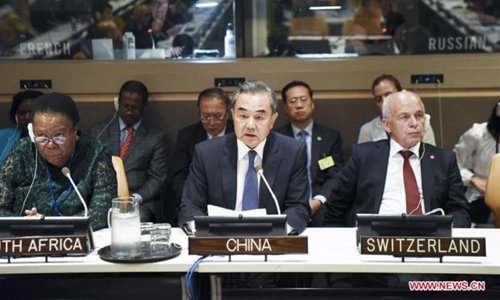HOME >> CHINA
Combating climate change: China's actions
Source:China Plus Published: 2019/9/25 9:00:48

Chinese State Councilor and Foreign Minister Wang Yi addresses the commemoration of the 70th anniversary of the signing of the Geneva Conventions at the UN headquarters in New York, Sept. 23, 2019. (Photo: Xinhua)
We only have one earth. Meeting the climate challenge together is the calling of our time. On 23 September 2019, Secretary General of the United Nations António Guterres convened the UN Climate Change Summit at UN Headquarters in New York. The purpose of the summit is to display the actions and achievements of all parties in responding to climate change, providing political thrust for global climate cooperation, and scaling up the ambition and level of global climate actions.
Since the 1980s, mankind has increasingly come to realize the severity of climate change and the urgent need for action. Climate change has become a crosscutting issue involving environmental protection, development, diplomacy and global governance. In 1992, the United Nations Framework Convention on Climate Change was adopted and opened for signature. It established the ultimate goal for coping with climate change, and put forward such principles as equity, common but differentiated responsibilities and respective capabilities, thus laying the legal foundation for global climate governance and providing the main channel of the multilateral climate governance process. In late 2015, the 21st Conference of the Parties to the United Nations Framework Convention on Climate Change (COP21) reached the Paris Agreement, establishing the post-2020 global climate governance architecture with nationally determined contribution as the mainstay, ushering a new stage in global climate governance.
In recent years, climate change has become a most debated topic in the world. Unlike the previous climate summits, this Summit put special emphasis on "action". Indeed, global climate governance suffers headwind and is edging forward midst twists and turns. On the one hand, a few major countries withdrew from their Treaty commitments and went backpedaling. On the other hand, a lot more has been said than done in global climate governance.
The force of the wind tests the strength of the grass. A critical moment often throws the will to perform one's duty into sharp relief. While global climate governance confronts difficulties and challenges, China is standing up for it.
China has actively participated in the intergovernmental negotiation process on climate change and played an important role in the adoption and entry into force of the Paris Agreement. On 30 November 2015, President Xi Jinping attended the opening ceremony of COP21 and delivered an important speech, where he expounded on China's proposition on global climate cooperation, showcased China's resolve and achievements in promoting ecological progress and put forward new measures for South-South cooperation on climate change. Against the backdrop of America's withdrawal from the Paris Agreement and increasing uncertainties in the global multilateral process, Chinese leaders have spoken on many occasions to manifest China's support for the Paris Agreement and firm stance on actively coping with climate change and extensively participating in climate governance. In early 2017, President Xi reaffirmed China's firm support for the Paris Agreement at the UN headquarters in Geneva, stressing that all parties should jointly promote the implementation of the Paris Agreement and articulating China's readiness to take continued climate actions and fully fulfill its obligations.
China not only stands as an active participant and mover in the negotiation process, but also acts as a champion for international climate cooperation under other multilateral frameworks. China has vigorously intensified dialogue and cooperation with relevant countries and international institutions. Climate diplomacy has become a highlight of China's efforts for improved global governance and a community with a shared future for mankind. In November 2018 and June 2019, China held trilateral meetings with France and the United Nations on climate change on the margins of the G20 Buenos Aires and Osaka Summits, providing support for global climate cooperation with concrete actions. China organized the Ministerial on Climate Action with Canada and the European Union, and took part in the BASIC Ministerial Meeting and other coordination and dialogue mechanisms in an effort to build consensus and boost confidence in global climate actions. China has also helped other developing countries enhance their capabilities to cope with climate change through deepened south-south cooperation, winning high acclaims from the international community.
Actions speak louder than words. China not only calls on others to take actions, but more importantly asks itself to do it. China has always regarded climate actions as a major strategy for economic and social development, and an inherent requirement by accelerated transformation of economic development model and high-quality development. The goal of capping greenhouse gases emissions has been incorporated into national medium- to long-term economic and social development plans, and goals for climate actions by 2020 and 2030 have been set. All these have demonstrated China's clear-cut attitude and firm resolve to fulfill its obligations under the Paris Agreement and cooperate with other countries in tackling the climate challenge. Compared to 2015, China's carbon emission intensity per unit of GDP dropped by about 45.8% in 2018, hitting the target of a 40% to 45% reduction by 2020 ahead of schedule. The proportion of non-fossil energy in primary energy consumption reached 14.3% in 2018.
A good seaman is known in a challenging weather. China's commitment to global climate cooperation is firm and its achievements in coping with climate change are there for all to see. Climate change is a threat that hinges on the future and destiny of all mankind, and calls for concerted and collective efforts of the whole world. Those who pursue a just cause have the support of all. Upholding multilateralism and actively promoting global climate governance, China is standing on the right side of history and morality, and therefore receiving more and more understanding and support from the international community. With the joint efforts of China and the rest of the whole world, the future of mankind will surely be brighter.
RELATED ARTICLES:
Posted in: DIPLOMACY